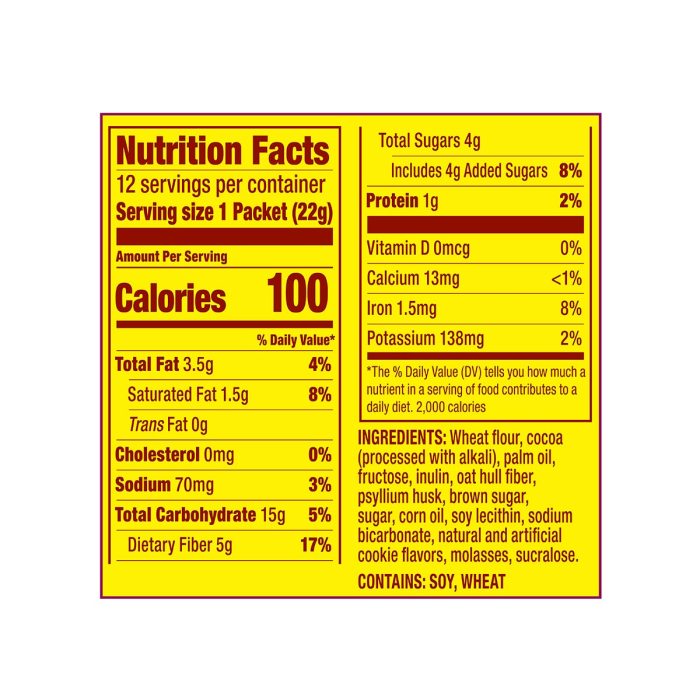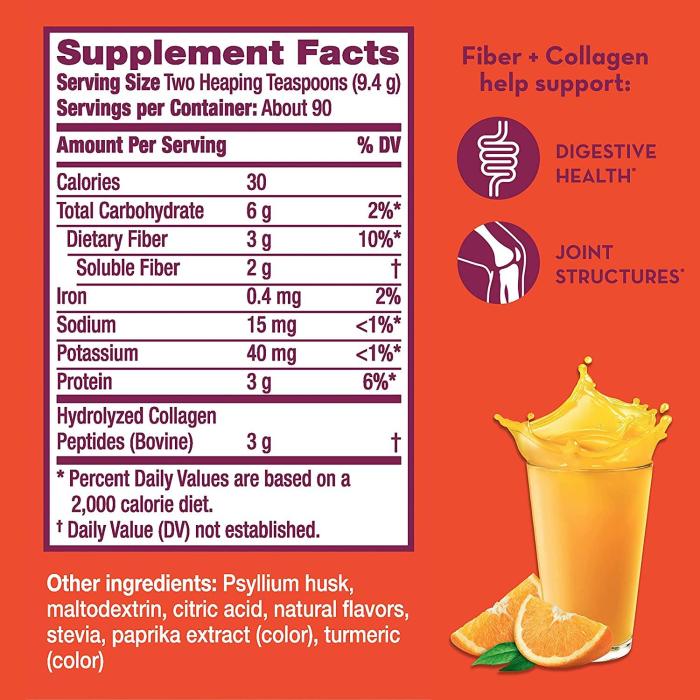Nutritional Composition of Metamucil Powder

Metamucil powder nutrition facts – Metamucil powder, a popular psyllium husk fiber supplement, offers a unique nutritional profile distinct from many other dietary supplements. Understanding its macronutrient composition, fiber types, and vitamin/mineral content is crucial for assessing its role in a balanced diet and overall health. This analysis delves into the specifics of Metamucil’s nutritional breakdown, providing a comparative perspective to other common fiber supplements.
Macronutrient Content of Metamucil Powder
The macronutrient content of Metamucil powder is primarily characterized by its high fiber content, with minimal contributions from protein and fat. A typical serving size varies depending on the specific Metamucil product, but we will use a common serving size for illustration. The following table presents a generalized macronutrient breakdown, and it is crucial to always refer to the nutrition facts label on your specific product packaging for accurate information.
| Nutrient | Amount per Serving | % Daily Value | Unit |
|---|---|---|---|
| Carbohydrates | 2g | <1% | grams |
| Dietary Fiber | 3.1g | 12% | grams |
| Protein | <1g | <1% | grams |
| Total Fat | 0g | 0% | grams |
Fiber Content and Health Benefits
Metamucil’s primary active ingredient is psyllium husk, an excellent source of soluble fiber. Soluble fiber absorbs water and forms a gel-like substance in the digestive tract. This gel slows down digestion, promoting feelings of fullness and potentially aiding in weight management. Furthermore, soluble fiber helps regulate blood sugar levels by slowing the absorption of glucose. Psyllium husk also contains some insoluble fiber, which adds bulk to the stool and promotes regularity.
The combined effects of soluble and insoluble fiber contribute to improved digestive health and can alleviate symptoms of constipation. Specific health benefits attributed to psyllium husk fiber include reduced cholesterol levels, improved bowel regularity, and enhanced blood sugar control.
Vitamin and Mineral Content
Metamucil powder typically contains minimal amounts of vitamins and minerals. While some formulations might be fortified, the primary nutritional contribution remains its fiber content. The absence of significant vitamin and mineral content necessitates relying on other dietary sources to meet daily nutritional needs. It’s important to note that any vitamin or mineral content listed will vary based on the specific Metamucil product and should be checked on the product label.
Comparison to Other Fiber Supplements
The nutritional profile of Metamucil powder differs significantly from other common fiber supplements. For example, wheat bran is a good source of insoluble fiber, providing a different texture and digestive effect compared to the soluble fiber in Metamucil. Other supplements like inulin or chia seeds offer various fiber types and additional nutrients such as protein or omega-3 fatty acids.
Metamucil stands out primarily for its high concentration of psyllium husk fiber and its focus on promoting digestive regularity and blood sugar control.
- Metamucil: High in soluble fiber (psyllium husk), low in other nutrients.
- Wheat Bran: High in insoluble fiber, good source of some B vitamins and minerals.
- Chia Seeds: Good source of both soluble and insoluble fiber, rich in omega-3 fatty acids and protein.
- Inulin: Primarily a soluble fiber, found in many fruits and vegetables; often added to processed foods as a prebiotic.
Potential Side Effects and Precautions: Metamucil Powder Nutrition Facts
Metamucil, while generally considered safe for most individuals, can cause various side effects, particularly if not used as directed. Understanding these potential issues and taking appropriate precautions is crucial for safe and effective use. This section details potential side effects, precautions for specific health conditions, and recommendations for minimizing adverse effects.
Potential Side Effects of Metamucil
Consuming Metamucil can lead to gastrointestinal discomfort. The most commonly reported side effects include gas, bloating, and abdominal cramping. These are often mild and transient, resolving as the body adjusts to the increased fiber intake. However, more severe reactions, though less common, can occur. It’s important to start with a low dose and gradually increase it to allow your digestive system to adapt.
Severe abdominal pain or discomfort warrants immediate cessation of use and consultation with a healthcare professional. Dehydration is another potential concern; Metamucil absorbs water in the digestive tract, so adequate fluid intake is essential.
Precautions for Individuals with Specific Health Conditions
Several health conditions require caution when considering Metamucil use. Individuals with diabetes should monitor their blood glucose levels closely, as Metamucil can affect glucose absorption. Those with heart conditions should consult their physician, as Metamucil’s impact on electrolyte balance could potentially interact with medications. Similarly, individuals with kidney disease need to exercise caution, as Metamucil’s effect on fluid balance may exacerbate existing kidney issues.
In all cases, consulting a healthcare professional before incorporating Metamucil into their routine is recommended. This is especially critical for individuals managing chronic conditions or taking multiple medications.
Recommendations for Proper Usage and Dosage
To minimize potential side effects, it is crucial to follow the recommended dosage instructions precisely. Start with a lower dose than recommended and gradually increase the amount over several days to allow your body to adjust. Drinking plenty of water throughout the day is essential to prevent constipation and dehydration. Mix the powder thoroughly with at least 8 ounces of water or juice to avoid choking or esophageal blockage.
If you experience any persistent or worsening symptoms, discontinue use and seek medical advice. It is crucial to remember that Metamucil is a dietary supplement and not a substitute for a healthy diet and lifestyle.
Warnings and Contraindications, Metamucil powder nutrition facts
The following is a list of warnings and contraindications associated with Metamucil consumption:
- Do not use if you have difficulty swallowing. Metamucil powder can cause choking or esophageal obstruction.
- Do not use if you have a bowel obstruction. This could worsen the obstruction.
- Consult your doctor before use if you are pregnant, breastfeeding, or taking other medications. Interactions with certain medications are possible.
- Discontinue use and consult a physician if you experience severe abdominal pain, vomiting, or rectal bleeding. These could indicate a serious medical problem.
- Ensure adequate fluid intake. Dehydration is a potential risk with Metamucil use.
Metamucil Powder in Different Flavors and Forms

Metamucil, a popular psyllium husk fiber supplement, is available in various flavors and forms to cater to diverse preferences and needs. Understanding the nuances of these variations is crucial for making informed choices and maximizing the benefits of this product. This section will delve into the differences in nutritional content, preparation methods, and the impact of added ingredients across Metamucil’s product line.
Nutritional Comparison Across Metamucil Flavors
The nutritional information of Metamucil powder varies slightly depending on the flavor. While the core ingredient, psyllium husk, remains consistent, the addition of sweeteners, artificial flavors, and other additives alters the overall macronutrient profile. For instance, a comparison of the nutritional facts of unflavored Metamucil versus a flavored variant might reveal differences in sugar content, calories, and potentially other micronutrients depending on the specific flavoring agents used.
It is important to carefully review the nutrition label of each specific flavor to make an informed choice based on individual dietary needs and preferences. Generally, unflavored varieties offer a cleaner nutritional profile with fewer added sugars and artificial ingredients.
Preparation and Usage: Powder vs. Capsules
Metamucil is available in both powder and capsule forms. The powder form requires mixing with a sufficient amount of liquid (at least 8 ounces of water) before consumption to prevent choking or esophageal blockage. This method allows for greater control over the quantity consumed and easier incorporation into food and beverages. Capsules, on the other hand, offer a more convenient, pre-portioned option for those who find mixing powder inconvenient.
However, capsules typically contain a smaller dose of psyllium husk compared to a single serving of the powder. The choice between powder and capsules depends on individual preferences and convenience factors. Always follow the manufacturer’s instructions for the correct dosage and preparation method for the chosen form.
Impact of Added Ingredients on Nutritional Profile
The addition of sweeteners, flavors, and other ingredients significantly impacts the overall nutritional profile of Metamucil. Flavored varieties often contain added sugars, artificial sweeteners, and artificial flavors, which can increase the calorie count and alter the glycemic index. These additions can also affect the overall digestibility and potential side effects for some individuals. For example, individuals sensitive to artificial sweeteners might experience digestive discomfort.
Consumers seeking a cleaner nutritional profile should opt for unflavored Metamucil or carefully examine the ingredient list of flavored options to assess the impact of added ingredients on their specific dietary needs.
Incorporating Metamucil Powder into Recipes
Metamucil powder can be easily incorporated into various food items to increase fiber intake without significantly altering the taste or texture of the dish. However, it’s crucial to mix it thoroughly with sufficient liquid to prevent clumping.
- Smoothies: Adding one to two tablespoons of Metamucil powder to a smoothie significantly boosts its fiber content. The powder blends seamlessly into the liquid base, making it a convenient and effective way to increase daily fiber intake.
- Baked Goods: Metamucil powder can be incorporated into recipes for muffins, breads, and cookies, adding moisture and fiber. However, it is important to experiment with the quantity to find the right balance to avoid affecting the texture too significantly. A small amount added gradually is recommended to avoid a gummy texture.
- Oatmeal: Stirring a spoonful of Metamucil powder into a bowl of hot oatmeal adds fiber and creates a thicker, creamier consistency. The slight thickening effect can be beneficial for those who prefer a more substantial breakfast.
Query Resolution
Is Metamucil suitable for children?
Consult a pediatrician before giving Metamucil to children, as dosage and suitability vary with age and health conditions.
Can I take Metamucil with other medications?
Metamucil can interact with certain medications. Consult your doctor or pharmacist to ensure safe concurrent use.
How much water should I drink with Metamucil?
Drink plenty of water with Metamucil to prevent it from thickening in the esophagus or intestines, potentially causing blockages. Follow package instructions for specific water recommendations.
What if I experience severe side effects?
Discontinue use and seek medical attention if you experience severe or persistent side effects such as severe abdominal pain, vomiting, or changes in bowel habits.
